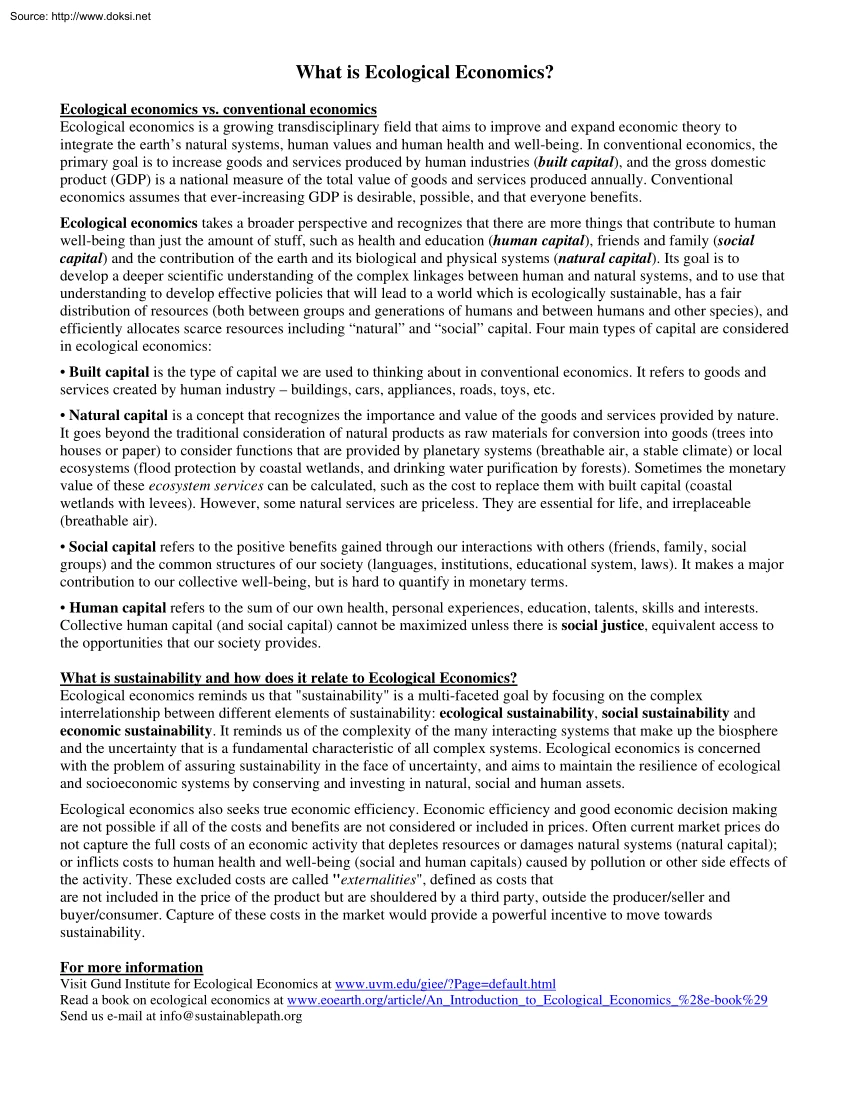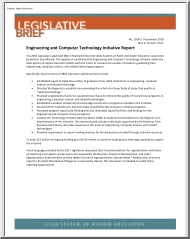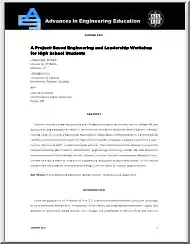Datasheet
Year, pagecount:2008, 1 page(s)
Language:English
Downloads:2
Uploaded:October 31, 2017
Size:457 KB
Institution:
-
Comments:
Attachment:-
Download in PDF:Please log in!
Comments
No comments yet. You can be the first!What did others read after this?
Content extract
Source: http://www.doksinet What is Ecological Economics? Ecological economics vs. conventional economics Ecological economics is a growing transdisciplinary field that aims to improve and expand economic theory to integrate the earth’s natural systems, human values and human health and well-being. In conventional economics, the primary goal is to increase goods and services produced by human industries (built capital), and the gross domestic product (GDP) is a national measure of the total value of goods and services produced annually. Conventional economics assumes that ever-increasing GDP is desirable, possible, and that everyone benefits. Ecological economics takes a broader perspective and recognizes that there are more things that contribute to human well-being than just the amount of stuff, such as health and education (human capital), friends and family (social capital) and the contribution of the earth and its biological and physical systems (natural capital). Its goal is
to develop a deeper scientific understanding of the complex linkages between human and natural systems, and to use that understanding to develop effective policies that will lead to a world which is ecologically sustainable, has a fair distribution of resources (both between groups and generations of humans and between humans and other species), and efficiently allocates scarce resources including “natural” and “social” capital. Four main types of capital are considered in ecological economics: • Built capital is the type of capital we are used to thinking about in conventional economics. It refers to goods and services created by human industry – buildings, cars, appliances, roads, toys, etc. • Natural capital is a concept that recognizes the importance and value of the goods and services provided by nature. It goes beyond the traditional consideration of natural products as raw materials for conversion into goods (trees into houses or paper) to consider functions that
are provided by planetary systems (breathable air, a stable climate) or local ecosystems (flood protection by coastal wetlands, and drinking water purification by forests). Sometimes the monetary value of these ecosystem services can be calculated, such as the cost to replace them with built capital (coastal wetlands with levees). However, some natural services are priceless They are essential for life, and irreplaceable (breathable air). • Social capital refers to the positive benefits gained through our interactions with others (friends, family, social groups) and the common structures of our society (languages, institutions, educational system, laws). It makes a major contribution to our collective well-being, but is hard to quantify in monetary terms. • Human capital refers to the sum of our own health, personal experiences, education, talents, skills and interests. Collective human capital (and social capital) cannot be maximized unless there is social justice, equivalent
access to the opportunities that our society provides. What is sustainability and how does it relate to Ecological Economics? Ecological economics reminds us that "sustainability" is a multi-faceted goal by focusing on the complex interrelationship between different elements of sustainability: ecological sustainability, social sustainability and economic sustainability. It reminds us of the complexity of the many interacting systems that make up the biosphere and the uncertainty that is a fundamental characteristic of all complex systems. Ecological economics is concerned with the problem of assuring sustainability in the face of uncertainty, and aims to maintain the resilience of ecological and socioeconomic systems by conserving and investing in natural, social and human assets. Ecological economics also seeks true economic efficiency. Economic efficiency and good economic decision making are not possible if all of the costs and benefits are not considered or included in
prices. Often current market prices do not capture the full costs of an economic activity that depletes resources or damages natural systems (natural capital); or inflicts costs to human health and well-being (social and human capitals) caused by pollution or other side effects of the activity. These excluded costs are called "externalities", defined as costs that are not included in the price of the product but are shouldered by a third party, outside the producer/seller and buyer/consumer. Capture of these costs in the market would provide a powerful incentive to move towards sustainability. For more information Visit Gund Institute for Ecological Economics at www.uvmedu/giee/?Page=defaulthtml Read a book on ecological economics at www.eoearthorg/article/An Introduction to Ecological Economics %28e-book%29 Send us e-mail at info@sustainablepath.org
to develop a deeper scientific understanding of the complex linkages between human and natural systems, and to use that understanding to develop effective policies that will lead to a world which is ecologically sustainable, has a fair distribution of resources (both between groups and generations of humans and between humans and other species), and efficiently allocates scarce resources including “natural” and “social” capital. Four main types of capital are considered in ecological economics: • Built capital is the type of capital we are used to thinking about in conventional economics. It refers to goods and services created by human industry – buildings, cars, appliances, roads, toys, etc. • Natural capital is a concept that recognizes the importance and value of the goods and services provided by nature. It goes beyond the traditional consideration of natural products as raw materials for conversion into goods (trees into houses or paper) to consider functions that
are provided by planetary systems (breathable air, a stable climate) or local ecosystems (flood protection by coastal wetlands, and drinking water purification by forests). Sometimes the monetary value of these ecosystem services can be calculated, such as the cost to replace them with built capital (coastal wetlands with levees). However, some natural services are priceless They are essential for life, and irreplaceable (breathable air). • Social capital refers to the positive benefits gained through our interactions with others (friends, family, social groups) and the common structures of our society (languages, institutions, educational system, laws). It makes a major contribution to our collective well-being, but is hard to quantify in monetary terms. • Human capital refers to the sum of our own health, personal experiences, education, talents, skills and interests. Collective human capital (and social capital) cannot be maximized unless there is social justice, equivalent
access to the opportunities that our society provides. What is sustainability and how does it relate to Ecological Economics? Ecological economics reminds us that "sustainability" is a multi-faceted goal by focusing on the complex interrelationship between different elements of sustainability: ecological sustainability, social sustainability and economic sustainability. It reminds us of the complexity of the many interacting systems that make up the biosphere and the uncertainty that is a fundamental characteristic of all complex systems. Ecological economics is concerned with the problem of assuring sustainability in the face of uncertainty, and aims to maintain the resilience of ecological and socioeconomic systems by conserving and investing in natural, social and human assets. Ecological economics also seeks true economic efficiency. Economic efficiency and good economic decision making are not possible if all of the costs and benefits are not considered or included in
prices. Often current market prices do not capture the full costs of an economic activity that depletes resources or damages natural systems (natural capital); or inflicts costs to human health and well-being (social and human capitals) caused by pollution or other side effects of the activity. These excluded costs are called "externalities", defined as costs that are not included in the price of the product but are shouldered by a third party, outside the producer/seller and buyer/consumer. Capture of these costs in the market would provide a powerful incentive to move towards sustainability. For more information Visit Gund Institute for Ecological Economics at www.uvmedu/giee/?Page=defaulthtml Read a book on ecological economics at www.eoearthorg/article/An Introduction to Ecological Economics %28e-book%29 Send us e-mail at info@sustainablepath.org





 Just like you draw up a plan when you’re going to war, building a house, or even going on vacation, you need to draw up a plan for your business. This tutorial will help you to clearly see where you are and make it possible to understand where you’re going.
Just like you draw up a plan when you’re going to war, building a house, or even going on vacation, you need to draw up a plan for your business. This tutorial will help you to clearly see where you are and make it possible to understand where you’re going.